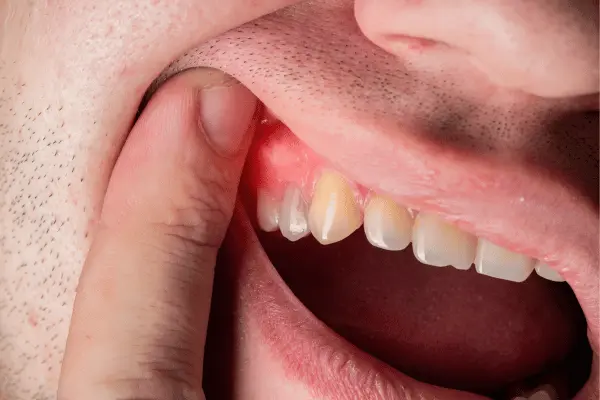Your Sore Gums Could Be Telling You Something! Causes, Treatment

Sore gums can be an uncomfortable and painful experience that affects many people at some point in their lives. While often associated with dental issues, sore gums can arise from various causes. Understanding these causes and knowing how to treat them effectively can help maintain oral health and alleviate discomfort.
Common Causes of Sore Gums
1. Gingivitis
Gingivitis, an inflammation of the gums, is the most common cause of sore gums. It is typically caused by the accumulation of plaque—a sticky film of bacteria—on teeth. If left untreated, gingivitis can progress to periodontitis, a more severe form of gum disease. According to Dr. Laura L. MacKenzie, a dentist based in California, “Gingivitis is often reversible with proper oral hygiene and regular dental check-ups.”
2. Periodontitis
Periodontitis is a more severe infection that affects the bones supporting the teeth. It can lead to gum recession, tooth mobility, and even tooth loss if not treated promptly. Symptoms may include persistent bad breath, pus between the gums and teeth, and changes in the bite. Dr. James G. Gentry, a periodontist, notes, “Maintaining good oral hygiene is crucial in preventing the progression from gingivitis to periodontitis.”
3. Hormonal Changes
Hormonal fluctuations during menstruation, pregnancy, or menopause can make gums more sensitive and prone to inflammation. Dr. Emily B. Johnson, an oral health expert, explains, “Women should be particularly vigilant about their gum health during hormonal changes, as these fluctuations can exacerbate gum issues.”
4. Vitamin Deficiencies
A lack of essential vitamins, particularly Vitamin C and Vitamin K, can lead to sore gums. Vitamin C is vital for collagen production, which helps maintain healthy gums. Dr. Susan E. Thomas, a nutritionist, emphasizes, “Incorporating fruits and vegetables rich in vitamins C and K into your diet can significantly improve gum health.”
5. Oral Hygiene Products
Some individuals may experience sensitivity or allergic reactions to certain oral hygiene products, such as toothpaste or mouthwash, containing harsh chemicals or allergens. Switching to natural or sensitive formulas can provide relief. Dr. Sarah M. Kahn, a dental hygienist, suggests, “Look for products that are free of sodium lauryl sulfate, as it can irritate sensitive gums.”
6. Tobacco Use
Tobacco products can damage gum tissue, making it more susceptible to infections. Smokers are at a higher risk of gum disease and delayed healing. Dr. Marcus J. Andrews, a tobacco cessation specialist, states, “Quitting smoking can significantly improve oral health and reduce the risk of sore gums.”
7. Ill-fitting Dental Appliances
Braces, dentures, and other dental appliances can irritate the gums if not fitted properly. Regular adjustments and consultations with a dentist can alleviate discomfort associated with dental devices.
Effective Treatments for Sore Gums
1. Improved Oral Hygiene
Practicing good oral hygiene is fundamental in preventing and treating sore gums. Brushing twice a day with fluoride toothpaste, flossing daily, and using an antimicrobial mouthwash can help reduce plaque buildup and inflammation.
2. Saltwater Rinse
A warm saltwater rinse can soothe sore gums and promote healing. Mix one teaspoon of salt in a cup of warm water and swish it around in your mouth for 30 seconds before spitting it out. This method can help reduce bacteria and inflammation.
3. Cold Compress
Applying a cold compress to the outside of the mouth can reduce swelling and numb the pain. Use a clean cloth wrapped around ice or a cold pack for 15-20 minutes at a time.
4. Over-the-Counter Pain Relief
Over-the-counter pain relievers like ibuprofen or acetaminophen can help manage pain and inflammation. However, consult with a healthcare professional before starting any medication.
5. Dietary Adjustments
Incorporating vitamin-rich foods into your diet can support gum health. Citrus fruits, leafy greens, and nuts are excellent sources of Vitamin C and K.
6. Regular Dental Check-Ups
Regular visits to the dentist are crucial for maintaining gum health. Professional cleanings can remove plaque and tartar buildup, while your dentist can identify early signs of gum disease.
7. Avoiding Irritants
If you suspect that oral hygiene products or tobacco are causing gum irritation, consider switching to gentler alternatives and avoiding tobacco altogether.
When to Seek Professional Help
If sore gums persist for more than a week, worsen, or are accompanied by other symptoms such as fever, swollen lymph nodes, or tooth mobility, it is essential to seek professional dental advice. Early intervention can prevent more severe conditions from developing.
Sore gums can result from a variety of factors, but understanding these causes and implementing effective treatments can help alleviate discomfort and maintain oral health. Always consult with dental professionals for personalized advice and treatment options. As Dr. MacKenzie emphasizes, “Prioritizing oral health through prevention and care is the best strategy for a healthy smile.” By taking proactive measures, individuals can enjoy healthier gums and overall improved well-being.






